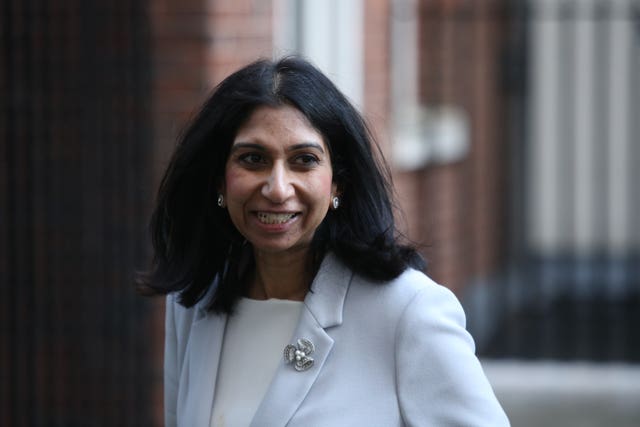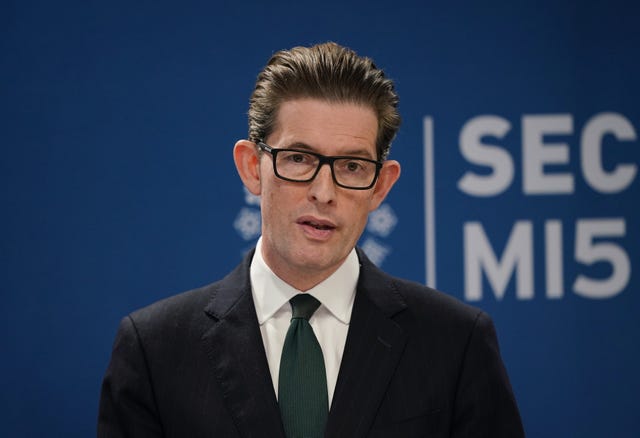Judge ‘misled’ in bid for injunction over BBC reporting of alleged MI5 informant
Then-Attorney General Suella Braverman sought the injunction at the High Court in 2022.

The High Court was “misled” by false information from MI5 during the Attorney General’s bid to prevent the BBC from identifying a suspected Security Service informant, a judge has been told.
In 2022, then-Attorney General Suella Braverman went to the High Court to stop the broadcaster airing a programme that would name a man who has allegedly abused two women and is a covert human intelligence source.
An injunction was made in April 2022 to prevent the corporation disclosing information likely to identify the man, referred to only as “X”, though Mr Justice Chamberlain said the BBC could still air the programme and the key issues, without identifying him.

At a hearing on Wednesday, the court in London heard that part of written evidence provided by MI5, reported to be from a deputy director in the Security Service, was false.
Jude Bunting KC, for the BBC, said: “This court was misled in the injunction proceedings.”
The written witness statement said the Security Service had maintained its policy of neither confirming nor denying (NCND) the identities of intelligence sources, according to the BBC.
However, the broadcaster has said MI5 disclosed X’s status to one of its reporters, but then said it had kept to the NCND policy.
The corporation has also said MI5 changed its position once the BBC provided evidence, including a recording of a phone call in which X’s status was confirmed to the reporter.
Following the hearing, MI5 director-general Sir Ken McCallum said the agency had “offered an unreserved apology to the court”.
And Home Secretary Yvette Cooper told MPs it was “clearly a very serious matter to provide incorrect information to the court”.

In the programme about X, the broadcaster alleged the intelligence source was a misogynistic neo-Nazi who attacked his girlfriend with a machete.
He was accused of exploiting his status to wage a long-running campaign of “terror” against his girlfriend, including threatening to kill her.
The police also allegedly uncovered extremist material in X’s home, but he later left the country and was said to have continued intelligence work.
The BBC said it had also located a separate woman who had suffered at the hands of X in a different country.
As well as misleading the High Court in the injunction bid, Mr Bunting said the Investigatory Powers Tribunal, which has heard a related case brought by the woman allegedly attacked with a machete, may have also been misled, as well as another set of High Court proceedings.
Mr Justice Chamberlain later said on Wednesday: “There is no contest that the evidence was not just misleading, it was false.
“Whether or not it was deliberately false is the subject of an investigation.”
In his statement, Sir Ken said: “It has become clear that MI5 provided incorrect information to the High Court in relation to an aspect of our witness statement.
“As soon as we became aware of the issue, we immediately took steps to correct that part of the statement.
“We take our duty to provide truthful, accurate and complete information very seriously, and have offered an unreserved apology to the court.
“The Home Secretary and I agreed that she would commission an external review in order to establish the facts and improve processes for the future.”
He continued: “MI5’s job is to protect the UK from national security threats, and the harms they cause. If in the course of that work we uncover safeguarding risk, we share it with the relevant authorities.
“Every day, agents put themselves in harm’s way, to gather vital intelligence about threats to our nation from terrorists and foreign states. For them to keep protecting us, we must protect them and their identities from all those who would do them harm. This is our legal – and moral – duty.
“The use of agents is difficult, human work that is governed by legislation and tightly overseen. It is fundamental to MI5’s ability to keep the UK safe.”
Ms Cooper said: “MI5 do an incredibly difficult and important job every single day to keep our country safe from a wide range of threats, working to the highest of standards, and it is of course essential that those high standards must always be maintained.
“Protecting national security is the first duty of the state, and the work of our intelligence agencies is critical to keeping the UK and its citizens safe.
“Covert human intelligence sources – or agents – play a crucial role in that work, and maintaining the secrecy of their identities is essential to protect them, their families, the vital intelligence they provide, and the recruitment of future sources.”
But she said “all organisations must have robust safeguarding policies under continuous review and must take any allegation of domestic abuse extremely seriously”.





